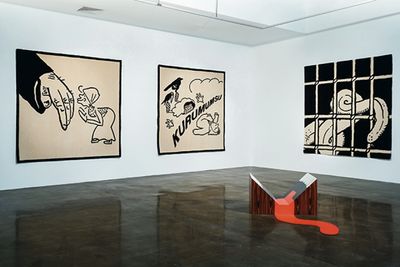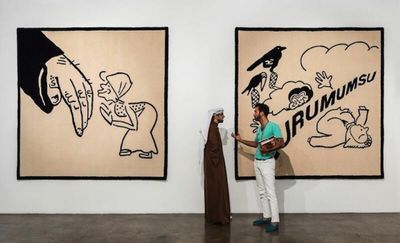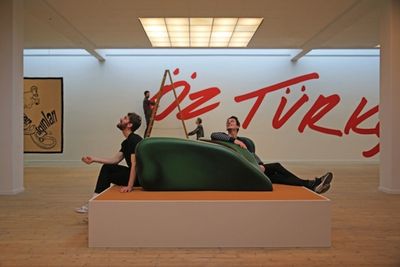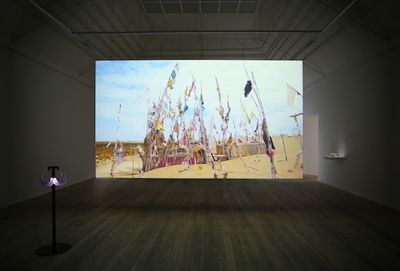Slavs and TatarsCollective Making 03 / Stongue
–
–
Kunsthal Aarhus presents COLLECTIVE MAKING 03 / Stongue by the artist collective Slavs and Tatars.
The exhibition looks at language politics as a form of etiquette in its written, oral, and visual registers. From medieval advice literature to the Russian avant-garde, Stongue examines language as a source of political, metaphysical, and even sexual emancipation.
Including new works produced especially for Kunsthal Aarhus, Slavs and Tatars’ Stongue highlights the COLLECTIVE MAKING 2015-2016 programme, which was developed by former Artistic Director Joasia Krysa, by showing an important aspect of collective thinking and making: language.
For one year, Slavs and Tatars’ work PrayWay has been permanently on display at Kunsthal Aarhus and is a symbol of the COLLECTIVE MAKING series.
Using the rear windshield of a Polski Fiat 126, a legendary car manufactured in Communist Poland, Weeping Window sets the tone for the exhibition with an anti-modernist trope, facing backwards to history, but moving forward towards the future, a recurring idea in Slavs and Tatars’ practice.
Stongue also contains Lektor, a multi-channel audio piece featuring an extract from the 11th-century Turkic epic poem Kutadgu Bilig (Wisdom of Royal Glory) in its original Uighur, together with voice-overs in various languages (German, Polish, Arabic, Gaelic and Danish). The particular excerpt of Kutadgu Bilig chosen for Lektor offers advice pertaining to speech and tongues: about how tongues can bring fortune and bad luck, profit and loss, and about what it means to loosen them, hold them or stick them out.
The series Love Letters examines the complex issue of alphabet politics: the attempts by nations, cultures, and ideologies to ascribe a specific set of letters to a given language. Love Letters consists of carpets based on the drawings of the Russian poet, playwright, and artist Vladimir Mayakovsky (1893-1930), the poster-child of a language used in the service of power.
Slavs and Tatars’ interest in translation stems from its potential for linguistic hospitality. In Samizabt: You Who Wronged, the lyricism of Communist-era Poland is shared as a best-practice for the Islamic Republic of Iran during its Solidarność-like stagnation and crisis of legitimacy.
The new film Deepthongs reflects on the various failed attempts, from Tsarist Russia to the Soviet Union, to cyrillicise non-Cyrillic-based languages. The imposition of graphemes or letters onto phonemes or sounds is never a neutral act. Alphabets accompany empires.
Opening performance
On the opening day, Slavs and Tatars presents The Tranny Tease, a lecture performance exploring the potential for transliteration through the lens of phonetic, semantic and theological slippage.
Stongue
As shorthand or a metonymic device for language, the tongue has a talismanic quality that can swing both ways. As the excerpt from Kutadgu Bilig states: So let your tongue bring forth your words if they are straight; but if they are crooked, then keep them hidden.
Slavs and Tatars is a faction of polemics and intimacies devoted to an area east of the former Berlin Wall and west of the Great Wall of China known as Eurasia. The collective’s practice is based on three activities: exhibitions, books and lecture performances. They have exhibited in major institutions internationally. Select solo engagements include MoMA, NY (2012), Secession, Vienna (2012), Dallas Museum of Art (2014), Kunsthalle Zurich (2014) and NYU Abu Dhabi (2015).
Slavs and Tatars have published several books, including Mirrors for Princes (JRP|Ringier / NYU Abu Dhabi, 2015), Not Moscow Not Mecca (Revolver/Secession, 2012), Khhhhhhh (Mousse/Moravia Gallery, 2012), Friendship of Nations: Polish Shi’ite Showbiz (Book Works, 2013) as well as their translation of the legendary Azeri satire Molla Nasreddin: the magazine that would’ve, could’ve, should’ve (JRP-Ringier, 2011).
Slavs and Tatars are nominated for the 2016 Vincent Award.
Exhibition period: 9 December - 6 March
Opening: 9 December, 5pm with the lecture performance The Tranny Tease.




